
Optimize your health now by understanding your genes.
Genetic Lifehacks gives you the tools to use your genetic raw data. Discover personalized health and wellness solutions right for you.
Use your genetic raw data from 23andMe, AncestryDNA, MyHeritage, and more.
- Privacy: Your genetic raw data stays securely on your own computer – it isn’t uploaded or stored on Genetic Lifehacks. Everything happens browser-side.
- Learn: Understand how your genes influence nutrition, supplements, longevity, disease risk, wellness, and more.
- Apply: See your genotypes, research-backed solutions, and decide what works best for you.
Already a member? Sign in here.
Latest Articles and Genotype Reports:
Brain Function and Mood Disorders (see all):
- Hypnosis Genes: Genetic Influences on Hypnosis
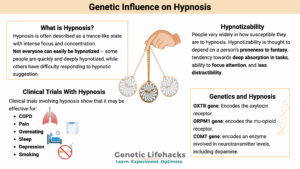 Not everyone is equally susceptible to hypnosis. Learn how your genetic variants play a role in how your brain focuses and responds to hypnotic suggestions.
Not everyone is equally susceptible to hypnosis. Learn how your genetic variants play a role in how your brain focuses and responds to hypnotic suggestions. - Lactate, Lactate Dehydrogenase, and Lactate Transporters
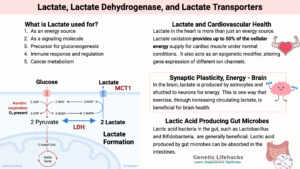 Lactate is much more than a workout byproduct—it’s a key energy source, signaling molecule, and regulator of metabolism, brain health, and disease.
Lactate is much more than a workout byproduct—it’s a key energy source, signaling molecule, and regulator of metabolism, brain health, and disease. - Reelin – Long Covid, Depression, and Alzheimer’s
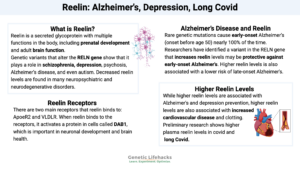 Reelin is a key glycoprotein involved in brain development, cognition, and neurodegenerative diseases like Alzheimer’s, schizophrenia, autism, and cardiovascular health.
Reelin is a key glycoprotein involved in brain development, cognition, and neurodegenerative diseases like Alzheimer’s, schizophrenia, autism, and cardiovascular health.
- Oxalates:What Your Genes and Diet Say About Oxalate Health Issues
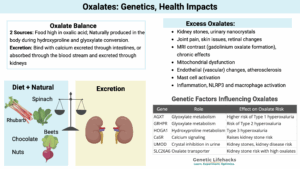 Green smoothies have been a health fad for quite a while now, but these health drinks can be a double-edged sword for some people due to their high oxalate content. Find out if you are genetically prone to kidney stones and what to do about it.
Green smoothies have been a health fad for quite a while now, but these health drinks can be a double-edged sword for some people due to their high oxalate content. Find out if you are genetically prone to kidney stones and what to do about it. - FOLR1 and FOLR2: Transporting Folate, Folinic Acid, and Folic Acid into Cells
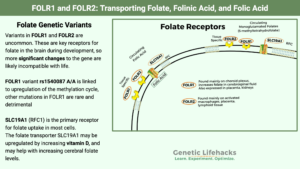 Genetic variants in the FOLR1 and FOLR2 genes (folate receptors alpha and beta) can impact folate in the brain and in the immune response.
Genetic variants in the FOLR1 and FOLR2 genes (folate receptors alpha and beta) can impact folate in the brain and in the immune response. - Carnitine: Genetic Variants Affecting Mitochondrial Energy and Health
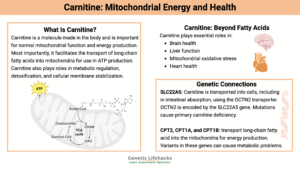 Learn how carnitine powers cellular energy, supports organ health, and influences metabolism. Discover its benefits for brain, liver and immune function, plus how genetics affect your carnitine needs.
Learn how carnitine powers cellular energy, supports organ health, and influences metabolism. Discover its benefits for brain, liver and immune function, plus how genetics affect your carnitine needs.
- Lactate, Lactate Dehydrogenase, and Lactate Transporters
 Lactate is much more than a workout byproduct—it’s a key energy source, signaling molecule, and regulator of metabolism, brain health, and disease.
Lactate is much more than a workout byproduct—it’s a key energy source, signaling molecule, and regulator of metabolism, brain health, and disease. - Elevated Fibrinogen: Risk factor for blood clots
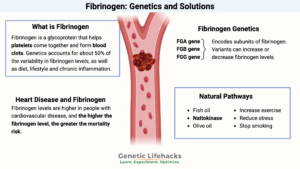 Fibrinogen is a protein that is essential for creating blood clots when you get a wound. But higher levels of fibrinogen are a major risk factor for heart disease and DVT. Learn how your genes impact your fibrinogen level.
Fibrinogen is a protein that is essential for creating blood clots when you get a wound. But higher levels of fibrinogen are a major risk factor for heart disease and DVT. Learn how your genes impact your fibrinogen level. - BPIFB4 Gene: Linked to Longevity and Heart Health
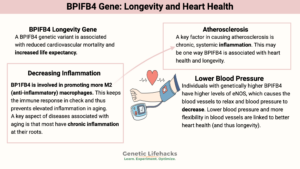 Discover the impact of the BPIFB4 gene on longevity and immunity, and find out if you have the longevity variant in your genotype report.
Discover the impact of the BPIFB4 gene on longevity and immunity, and find out if you have the longevity variant in your genotype report.
Supplements and Your Genes (see all):
- Cordyceps: Clinical Trials, Mechanism of Action, and Genetic Connections
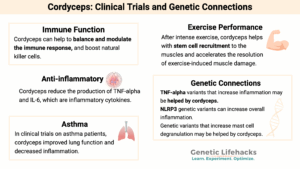 Cordyceps mushroom extract has immunomodulatory and anti-inflammatory effects. Studies show benefits for asthma, resistance training, endurance training, and kidney disease.
Cordyceps mushroom extract has immunomodulatory and anti-inflammatory effects. Studies show benefits for asthma, resistance training, endurance training, and kidney disease. - Methylene Blue: Genetic Connections and Research Studies
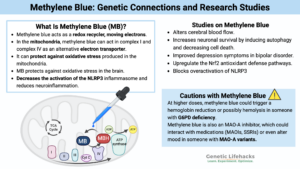 Methylene blue has neuroprotective and anti-inflammatory properties, but it isn’t for everyone. Learn about the genetic variants that throw a caution flag on this one.
Methylene blue has neuroprotective and anti-inflammatory properties, but it isn’t for everyone. Learn about the genetic variants that throw a caution flag on this one. - Resveratrol: Studies, Genetic Interactions, and Bioavailability
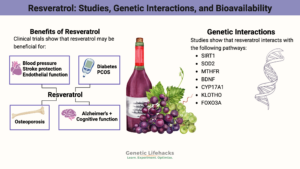 Resveratrol is a polyphenol with anti-inflammatory and antioxidant properties. Studies show that it affects heart health, bone health, cognitive function, and metabolic health.
Resveratrol is a polyphenol with anti-inflammatory and antioxidant properties. Studies show that it affects heart health, bone health, cognitive function, and metabolic health.
Athletics & Exercise (see all):
- Lactate, Lactate Dehydrogenase, and Lactate Transporters
 Lactate is much more than a workout byproduct—it’s a key energy source, signaling molecule, and regulator of metabolism, brain health, and disease.
Lactate is much more than a workout byproduct—it’s a key energy source, signaling molecule, and regulator of metabolism, brain health, and disease. - Resistance Training Genetics: Personalized Muscle Building
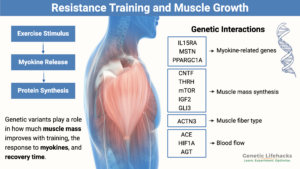 Learn how genetics and lifestyle factors influence muscle growth from resistance training. Covers the science behind strength gains, from molecular pathways to genetic applications backed by research.
Learn how genetics and lifestyle factors influence muscle growth from resistance training. Covers the science behind strength gains, from molecular pathways to genetic applications backed by research. - Skinny Genes: Weight Loss from Aerobic Exercise
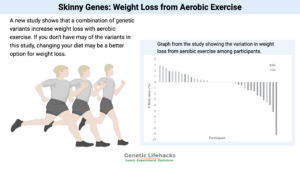 Researchers have found that weight loss from aerobic exercise depends on your genetic variants. Find out if you have skinny genes from exercise.
Researchers have found that weight loss from aerobic exercise depends on your genetic variants. Find out if you have skinny genes from exercise.
Inflammation & Immune Response (see all):
- Specialized Pro-resolving Mediators (SPMs): The Resolution of Inflammation
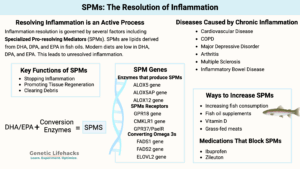 Chronic inflammation is at the root of all diseases. New research discusses how pro-resolving mediators are the key to the resolution of inflammation.
Chronic inflammation is at the root of all diseases. New research discusses how pro-resolving mediators are the key to the resolution of inflammation. - Epstein-Barr Virus: Genetic Risks, Reactivation, and Chronic Illnesses
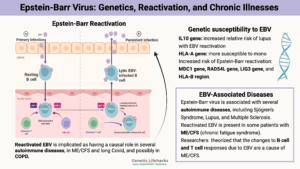 Epstein-Barr virus (EBV) impacts lifelong health, links to autoimmune diseases, genetic risk factors, and practical steps to reduce reactivation.
Epstein-Barr virus (EBV) impacts lifelong health, links to autoimmune diseases, genetic risk factors, and practical steps to reduce reactivation. - Mast Cells: MCAS, Genetics, and Solutions
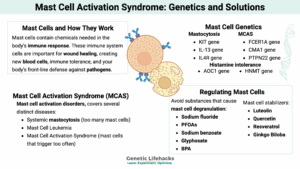 Mast cells are essential to your innate immune system, defending against pathogens and allergens. For some people, mast cells can be triggered too easily, giving allergy-like responses to lots of different substances.
Mast cells are essential to your innate immune system, defending against pathogens and allergens. For some people, mast cells can be triggered too easily, giving allergy-like responses to lots of different substances.
- Testosterone: Genetic Variants that Impact Testosterone Levels
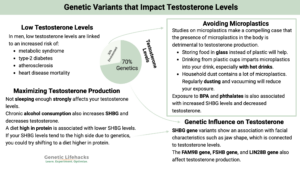 While diet and lifestyle play a role in testosterone levels, in males, there is a strong genetic component as well. Check out your genes to see if they are playing a role in your low T levels — and then check out the Lifehacks.
While diet and lifestyle play a role in testosterone levels, in males, there is a strong genetic component as well. Check out your genes to see if they are playing a role in your low T levels — and then check out the Lifehacks. - HPA Axis Dysfunction: Understanding Cortisol and Genetic Interactions
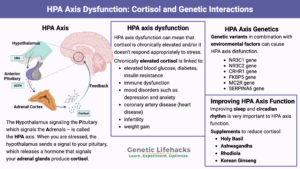 Cortisol is a hormone produced by the adrenal glands in times of stress, and it also plays many roles in your normal bodily functions. It is a multi-purpose hormone that needs to be in the right amount (not too high, not too low) and at the right time. Your genes play a big role in how likely you are to have problems with cortisol.
Cortisol is a hormone produced by the adrenal glands in times of stress, and it also plays many roles in your normal bodily functions. It is a multi-purpose hormone that needs to be in the right amount (not too high, not too low) and at the right time. Your genes play a big role in how likely you are to have problems with cortisol. - Thyroid Hormones: Genes, Hypothyroidism, and T4/T3 Conversion
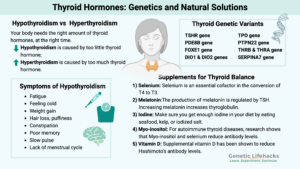 The thyroid is a master regulator controlling many of your body’s systems. It is integral for metabolism and body temperature. Learn more about specific thyroid-related variants and check your genetic raw data.
The thyroid is a master regulator controlling many of your body’s systems. It is integral for metabolism and body temperature. Learn more about specific thyroid-related variants and check your genetic raw data.
Sleep & Circadian Rhythm (see all):
- Snoring: Genes and Solutions
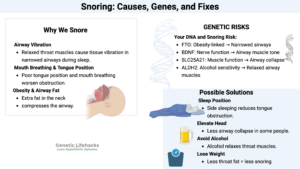 Genetics plays a role in snoring —certain genes affect airway structure, fat distribution, and muscle control.
Genetics plays a role in snoring —certain genes affect airway structure, fat distribution, and muscle control. - Problems sleeping? Your genes can point to individualized solutions
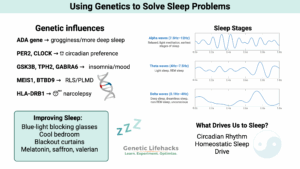 Overview how your genes impact sleep, including insomnia, restless leg, narcolepsy, and circadian rhythm genes.
Overview how your genes impact sleep, including insomnia, restless leg, narcolepsy, and circadian rhythm genes. - How to Shift Your iPhone Screen to Red at Night
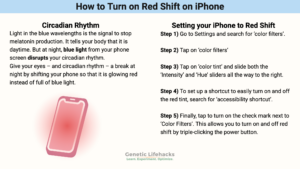 Learn how to shift your iphone screen to be completely red at night (no blue light) with a triple-click of the power button.
Learn how to shift your iphone screen to be completely red at night (no blue light) with a triple-click of the power button.
Longevity & Healthspan (see all):
- Snoring: Genes and Solutions
 Genetics plays a role in snoring —certain genes affect airway structure, fat distribution, and muscle control.
Genetics plays a role in snoring —certain genes affect airway structure, fat distribution, and muscle control. - Problems sleeping? Your genes can point to individualized solutions
 Overview how your genes impact sleep, including insomnia, restless leg, narcolepsy, and circadian rhythm genes.
Overview how your genes impact sleep, including insomnia, restless leg, narcolepsy, and circadian rhythm genes. - How to Shift Your iPhone Screen to Red at Night
 Learn how to shift your iphone screen to be completely red at night (no blue light) with a triple-click of the power button.
Learn how to shift your iphone screen to be completely red at night (no blue light) with a triple-click of the power button.
- Skinny Genes: Weight Loss from Aerobic Exercise
 Researchers have found that weight loss from aerobic exercise depends on your genetic variants. Find out if you have skinny genes from exercise.
Researchers have found that weight loss from aerobic exercise depends on your genetic variants. Find out if you have skinny genes from exercise. - Dyslexia: Genes + Early Life Stressors
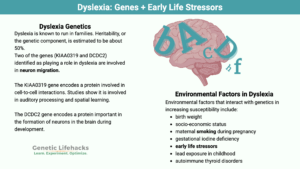 While dyslexia is known to run in families, the role of genetics in dyslexia is still being determined. Here is a quick look at some of the genes involved in dyslexia, affecting around 10% of the population.
While dyslexia is known to run in families, the role of genetics in dyslexia is still being determined. Here is a quick look at some of the genes involved in dyslexia, affecting around 10% of the population. - Mosquito Bite Genes: Are you a mosquito magnet?
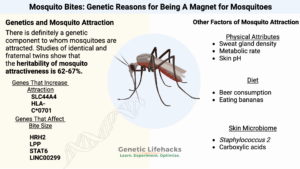 Do you feel like you are a magnet for mosquitoes? Genetic variants do play a role in how attractive you are to mosquitoes.
Do you feel like you are a magnet for mosquitoes? Genetic variants do play a role in how attractive you are to mosquitoes.
- FTO and m6A Methylation
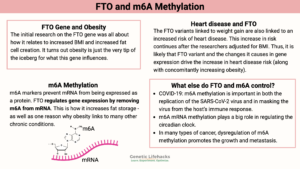 Recently, researchers discovered that FTO is an m6A eraser that removes methyl groups from mRNA. This discovery has opened up huge avenues of research on topics from cancer to immune response to heart disease.
Recently, researchers discovered that FTO is an m6A eraser that removes methyl groups from mRNA. This discovery has opened up huge avenues of research on topics from cancer to immune response to heart disease. - Picking the Right Weight Loss Diet for Your Genes
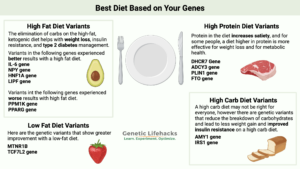 Is there an easy way to compare what diet might be best based on your genotype? Research shows some interesting associations between genotype and diet interactions and weight loss.
Is there an easy way to compare what diet might be best based on your genotype? Research shows some interesting associations between genotype and diet interactions and weight loss. - Adenoviruses: Causing Weight Gain and Obesity
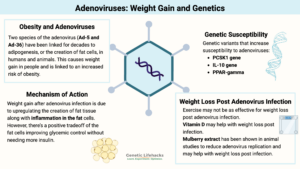 There have been several interesting studies linking obesity to a viral infection, specifically an adenovirus. Learn more about this virus and its association with obesity.
There have been several interesting studies linking obesity to a viral infection, specifically an adenovirus. Learn more about this virus and its association with obesity.
Pregnancy & Infertility (see all):
- Pregnancy: How Your Genes affect the Nutrients You Need
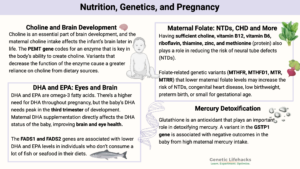 Pregnancy is a time of increased nutritional needs, and your genes can help you dial in your diet to prevent nutrient deficiencies.
Pregnancy is a time of increased nutritional needs, and your genes can help you dial in your diet to prevent nutrient deficiencies. - Trying to get pregnant? Targeted Approaches to Improving Egg Quality
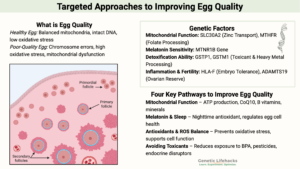 Trying to get pregnant? Healthy eggs are vital for a successful pregnancy. Discover four key ways to improve your egg quality, according to research studies.
Trying to get pregnant? Healthy eggs are vital for a successful pregnancy. Discover four key ways to improve your egg quality, according to research studies. - Folate Optimization: MTHFR and Fertility
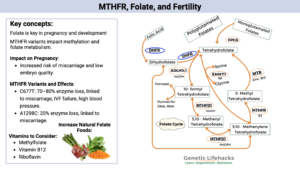 MTHFR variants affect the conversion of folate into the active form. Learn how this can affect you if you are trying to get pregnant.
MTHFR variants affect the conversion of folate into the active form. Learn how this can affect you if you are trying to get pregnant.
Detoxification & Medications (see all):
- Opioid Receptors Genetic Variants and Addiction
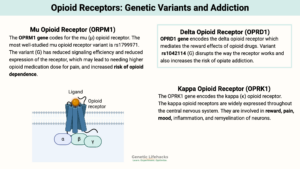 Genetic variants in the ORPM1 gene impact both the amount of pain someone experiences and their response to opioid drugs. These variants are also important in susceptibility to opiate addiction. (Member’s article)
Genetic variants in the ORPM1 gene impact both the amount of pain someone experiences and their response to opioid drugs. These variants are also important in susceptibility to opiate addiction. (Member’s article) - Microplastics Research Roundup
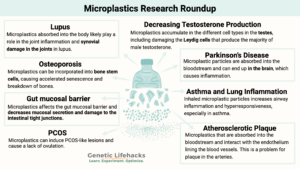 Microplastics research shows that these microscopic bits of plastics are a real problem for health and wellness.
Microplastics research shows that these microscopic bits of plastics are a real problem for health and wellness. - BPA and BPS: How Your Genes Influence Bisphenol Detoxification
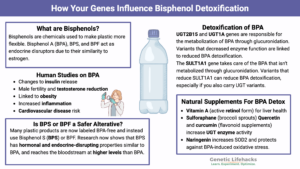 BPA, a chemical found in some plastics, has been linked to a variety of health issues in people. Learn more about BPA and the research into genetic responses to this chemical.
BPA, a chemical found in some plastics, has been linked to a variety of health issues in people. Learn more about BPA and the research into genetic responses to this chemical.
- FTO and m6A Methylation
 Recently, researchers discovered that FTO is an m6A eraser that removes methyl groups from mRNA. This discovery has opened up huge avenues of research on topics from cancer to immune response to heart disease.
Recently, researchers discovered that FTO is an m6A eraser that removes methyl groups from mRNA. This discovery has opened up huge avenues of research on topics from cancer to immune response to heart disease. - Building Up Iron: Hemochromatosis Mutations
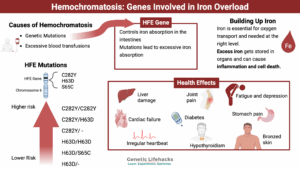 A couple of common mutations can cause you to build up iron, leading to iron overload or hemochromatosis. It is one genetic disease where knowledge is really powerful – you can completely prevent hemochromatosis through blood donations.
A couple of common mutations can cause you to build up iron, leading to iron overload or hemochromatosis. It is one genetic disease where knowledge is really powerful – you can completely prevent hemochromatosis through blood donations. - PCSK9: Cancer Recurrence & Prevention
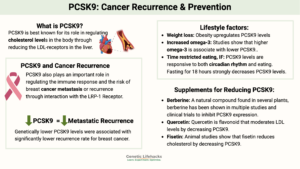 Lower PCSK9 levels have been shown in research studies to correlate to a significantly reduced risk of metastatic recurrence in certain types of cancer.
Lower PCSK9 levels have been shown in research studies to correlate to a significantly reduced risk of metastatic recurrence in certain types of cancer.
Autoimmune Diseases (see all):
- Celiac Genes: How to Check Your Raw Data
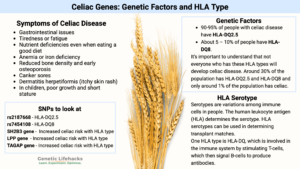 Celiac disease is caused by a combination of environmental factors (eating gluten, other factors) and having the genetic variants that cause susceptibility to the disease. Without the genetic susceptibility, you won’t have celiac.
Celiac disease is caused by a combination of environmental factors (eating gluten, other factors) and having the genetic variants that cause susceptibility to the disease. Without the genetic susceptibility, you won’t have celiac. - Thyroid Hormones: Genes, Hypothyroidism, and T4/T3 Conversion
 The thyroid is a master regulator controlling many of your body’s systems. It is integral for metabolism and body temperature. Learn more about specific thyroid-related variants and check your genetic raw data.
The thyroid is a master regulator controlling many of your body’s systems. It is integral for metabolism and body temperature. Learn more about specific thyroid-related variants and check your genetic raw data. - HLA-B27: Genetic Variant That Increases Susceptibility to Autoimmune Diseases
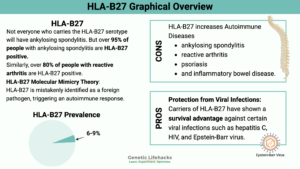 The HLA-B27 serotype is linked to an increased risk of several autoimmune diseases, including ankylosing spondylitis, psoriatic arthritis, and IBD.
The HLA-B27 serotype is linked to an increased risk of several autoimmune diseases, including ankylosing spondylitis, psoriatic arthritis, and IBD.
Mitochondrial Health (see all):
- Carnitine: Genetic Variants Affecting Mitochondrial Energy and Health
 Learn how carnitine powers cellular energy, supports organ health, and influences metabolism. Discover its benefits for brain, liver and immune function, plus how genetics affect your carnitine needs.
Learn how carnitine powers cellular energy, supports organ health, and influences metabolism. Discover its benefits for brain, liver and immune function, plus how genetics affect your carnitine needs. - Thiamine: Genomics, Cellular Energy, and Cognitive Function
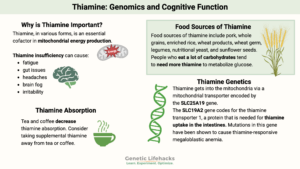 Also known as vitamin B1, thiamine is essential for energy production and brain function. Learn how your genes influence your need for thiamine.
Also known as vitamin B1, thiamine is essential for energy production and brain function. Learn how your genes influence your need for thiamine. - Glutathione: Master Antioxidant, Reducing Oxidative Stress, and Detoxification
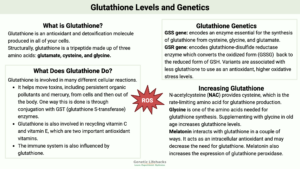 Glutathione is an antioxidant produced in all cells to balance out ROS. Genetic variants can impact your glutathione levels, which can alter your ability to detoxify certain substances or withstand stressors in the body.
Glutathione is an antioxidant produced in all cells to balance out ROS. Genetic variants can impact your glutathione levels, which can alter your ability to detoxify certain substances or withstand stressors in the body.
Explore by Symptoms, Supplements, Diet, or Pathway:
Symptoms
Supplements
Pathways & Processes
Diseases, Conditions
Lifestyle & Diet
Genes, Proteins
Hormones
Medications
Toxins
My Story…
Hi! I’m Debbie Moon. Welcome to Genetic Lifehacks.
When I first had my genetic data sequenced, I was both amazed at the research available in academic journals and frustrated by the difficult language and disconnected topics.
Genetic Lifehacks began as a way to share what I was learning about genetics with my family and friends.
My goal has always been to freely share information so that everyone can benefit.
As the website grew in popularity, I decided that I needed to know more… both more about genetics and more about how the pieces of the biological systems fit together. Since my undergraduate degree was in engineering, I went back to school and received my Master’s degree in Biological Sciences from Clemson University in 2019.
Now a full-time endeavor, Genetic Lifehacks has reached over 2.5 million readers, equipping people to use their genetic data to optimize their health.
~ Debbie Moon, Founder of Genetic Lifehacks
